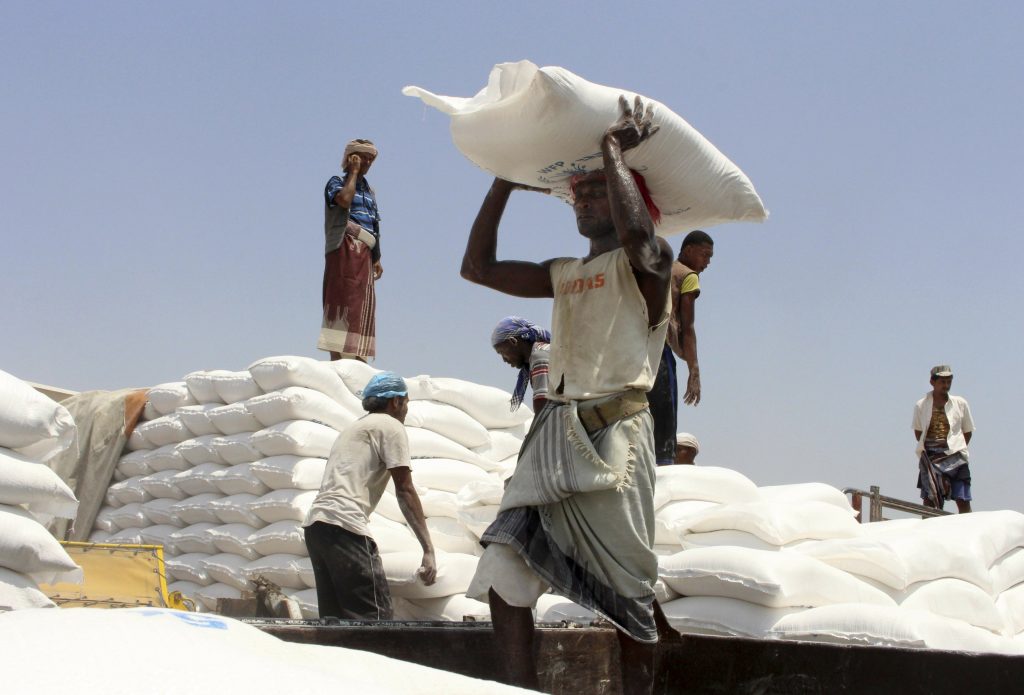
- ARAB NEWS
- 11 Jul 2025

When the fighting between the Iran-backed Houthi militia and forces loyal to the Saudi-backed government of Abed Rabbo Mansour Hadi intensified in Sirwah this month, the Houthis hastily fled their positions, leaving weapons and belongings behind. In one of their camps, located about 40 kilometers west of Marib, government troops found sacks of food, including wheat and boxes of oil bearing the logos of international aid agencies, which the Houthi leadership appears to have supplied to its fighters as sustenance.
The fate of any assistance that enters the areas controlled by the Houthis is precarious. Millions of dollars have been lost to lax oversight, an inability to monitor, and endemic corruption.
That the Houthis divert or steal aid that was designated for Yemen’s vulnerable population and distribute it to their fighters is not shocking at this stage because it has been happening for the duration of the conflict in Yemen. As a de facto authority that does not answer to anyone, the Houthis are able to redistribute assistance as they see fit and rationalize its use for their fighters. The problem, however, is that this mismanagement will continue to happen because there is no ability to have full oversight on the militia’s operations.
After activists circulated a video of the food aid left behind by the Houthi fighters, the UN World Food Program (WFP), whose logo was seen on some of the packages, criticized the Houthis for misusing aid that was intended for the needy. The WFP has had a difficult relationship with the Houthis and has now sounded the alarm over their corrupt practices. David Beasley, the executive director of the WFP in Yemen, told the UN Security Council in a briefing last year that the agency had, in late 2018, uncovered “serious evidence that food was being diverted and going to the wrong people” in the capital Sanaa and other Houthi-controlled areas. He added that up to 60 percent of beneficiaries at seven centers in Sanaa “confirmed they had not received any assistance,” and 33 percent of respondents in the Houthis’ northern stronghold of Saada did not receive any food in April 2019. Moreover, WFP food trucks have been targeted militarily on more than one occasion, once by shelling and on another occasion by a landmine.
Unfortunately, aid theft has now led to a reduction in aid. The WFP announced this month that it had halved the amount of aid it was delivering in Houthi-controlled areas. This decision was not abrupt. The WFP had repeatedly warned it would resort to this outcome if the Houthis continued to stifle their efforts.
Houthi fighters have also received significant assistance from the World Health Organization (WHO). According to Yemeni sources I spoke with who are familiar with the Houthi stronghold of Saada, several doctors affiliated with the WHO, who were brought in to respond to civilians’ medical needs, have inadvertently treated or operated on wounded or sick Houthi fighters. At every juncture, the Houthis put the needs of their leadership and fighters first, leaving Yemeni citizens at the bottom end of their calculations.
In February, Mark Lowcock, the UN undersecretary-general for humanitarian affairs, briefed the UN Security Council on the obstacles the organization is facing in Houthi areas; chief among them being the Houthis’ desire to levy a 2 percent tax on aid, which the agencies outright rejected. Lowcock has now repeated his warning of severe and unfair restrictions being placed on humanitarian agencies in Yemen, and singled out the Houthi rebel group as the worst offender.
The Houthis’ conduct with regards to aid is rarely publicly addressed. The Houthis assume that all aid or economic investments that need to be made within the country are the responsibility of aid agencies. Moreover, they are using local revenues and international resources to run their illicit operations. They take state funding that could be used in education, health or economic development and allocate it for their “war effort.” This has been a helpful factor for the Houthis, allowing them to focus on their conflict strategy while leaving service delivery as the main responsibility of others.
The WFP has had a difficult relationship with the Houthis and has now sounded the alarm over their corrupt practices.
Fatima Abo Alasrar
This problem needs a radical solution. Special UN Envoy to Yemen Martin Griffiths, who appears to be preparing for a new round of peace talks between the Hadi government and the Houthi rebels, needs to incorporate safeguards into any agreement that would guarantee the protection of Yemeni citizens from all abuses, including aid theft.
Unfortunately, without stricter oversight from the donor side and better management of humanitarian assistance, aid theft will remain a problem. The Houthis will continue diverting much-needed assistance for vulnerable people to their fighters. They will take advantage of this to boost their overall position during the conflict and upcoming peace talks. Without a decisive position that will put an end to this greed, vulnerable Yeminis will continue to suffer.